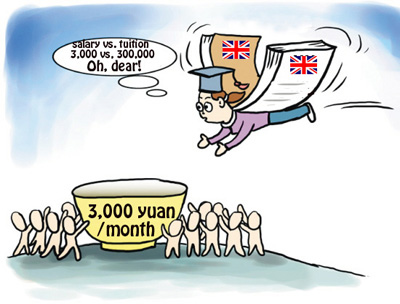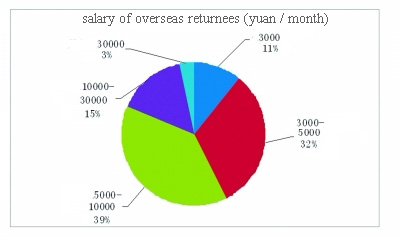
Starting salaries for overseas returnees now average only 3,000 yuan.

Survey made by the Education International Corporation in 2011.
(Ecns.cn)--Education abroad may no longer guarantee success in China according to a recent survey by the Education International Corporation (EIC), which reveals that starting salaries for overseas returnees now average only 3,000 yuan ($475), no better than a graduate from a Chinese university.
The survey was conducted among 7,000 returnees, 71 percent of whom are making 3,000-10,000 yuan per month, with only 15 percent earning salaries over 10,000 yuan. In addition, more than half of the respondents, or 58 percent, are grassroots staff, while senior managers account for a mere 6 percent.
Private companies have become the mainstream employers of returnees, the survey says, since it is has gotten much harder for them to obtain jobs at multinational companies or large state-owned enterprises.
The latest data from the Ministry of Human Resources and Social Security show that by 2010, a total of 632,200 Chinese had returned to the motherland, and another 500,000 are expected to come back during the Twelfth Five-Year Plan period.
Some have already fulfilled their dreams and some are exploring the options--yet many more are lost in a state of worried confusion.
According to statistics, returnees began losing their competitive edge in 2006, when about 47,000 overseas Chinese students came home: 35 percent of them found it difficult to obtain jobs and 40 percent felt they might be in the wrong business.
Sha Yezhou, now a major of finance and banking at the Queen Mary, University of London, has been busy job hunting since last September.
"In the past, overseas returnees were treated as rare species because they brought back advanced knowledge and technology. However, due to the rapid development of domestic communications systems, people can easily find the information they need online. Therefore, the returnees are not advantageous anymore," said Sha.
"Nobody feels confident about their future careers," he added, speaking of his Chinese classmates.
"I was nothing before going abroad. But someone told me that I would be something after receiving an education in a foreign country. However, even though I am now an overseas returnee, I still feel like nothing," noted Zhan Ning, who just returned to China from the UK this year.
Deng Feng, founding managing director and partner of Northern Light Venture Capital, analyzed that "as a 'returnee' it only means you have been abroad for a period of time. Three months of staying abroad and 30 years are definitely not the same."
Jobless returnees are usually young and have studied abroad only briefly, with no work experience at all. Because of this, job hunting is met with many setbacks, pointed out china.org.cn.
"Those who acquire a bachelor's degree at home and a master's degree abroad are unable to find jobs in one to two years after returning to China. We are discriminated against by some domestic businesses," the website quoted Ray, a returnee from Australia. "Even worse, at a recent recruitment fair for returnees, a Beijing planting company offered a salary of 2,500 yuan ($396) per month. Despite our huge investments in education, we cannot survive in Beijing on such a low salary!"
"A student will generally spend 250,000-300,000 yuan ($39,565-$47,477) abroad per year. However, with starting salary that is no better than a domestic college graduate, we are definitely not able to recover those costs within a short period," calculated Sha Yezhou.
According to the EIC survey, more and more middle class families with total annual incomes of less than 30,000 yuan are sending their children abroad. However, at such a small input-output ratio, many parents have begun to question whether their investments are worthwhile.
However, Hu Zuliu, former investment partner and managing director at Goldman Sachs Group Inc., pointed out at the Fourth Western Returnees Beijing Forum 2007 (WRBF): "With industrialization, urbanization, the prosperity of the private economy, and the expansion of international trade, China has become one of the fastest growing economies. These provide unprecedented opportunities for returnees."
Moreover, there is no lack of successful returnees in China, such as Robin Li (founder of Baidu, China's largest search engine) and Zhang Chaoyang, (founder of Sohu, one of the country's largest Internet portals).
"The term 'overseas returnee' will disappear after 20 years," china.org.cn cited Yang Zhuang (U.S.), dean of Beijing International MBA (BiMBA) and associate professor at the Business School of Fordham University, who delivered a speech at the WRBF.
David Zweig, director of the Center on China's Transnational Relations at the Hong Kong University of Science and Technology, also told china.org.cn that China and India have seen the largest population of oversees returnees, but he believes that they are a special group that only exists during a specific period of time when a nation's economic development increases the need for skilled workers.
There is no such term in the United States, Canada, or Europe, Zweig added, because in those cultures it is quite normal for a person to study abroad and then go back to his or her motherland. With the advancement of the Chinese education system, Zweig said he believes an increasing number of people will go abroad and then return.

Copyright ©1999-2011 Chinanews.com. All rights reserved.
Reproduction in whole or in part without permission is prohibited.